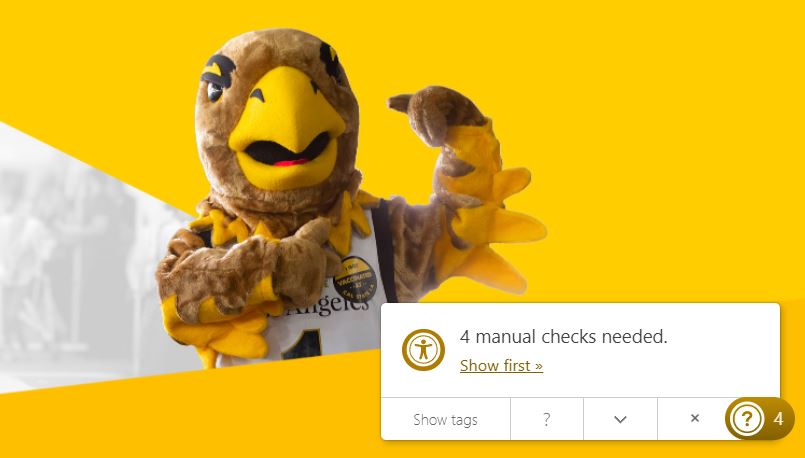All websites within the Cal State LA web environment must be accessible. This includes sites hosted on the University's Drupal web platform (www.calstatela.edu), on the University's web server (web.calstatela.edu), or those hosted or developed by third parties; the accessibility of the content within a website is the responsibility of the Cal State LA site owner and administrator.
The Drupal web platform includes various accessibility features to make it easier to create accessible websites. However, webpage content (including documents, video, and audio) that web authors add to a site must also be accessible; this includes images, links, tables, forms, etc. While creating or editing web content, follow the accessibility guidelines and best practices on the Web Accessibility Guidelines page. Before publishing a page, validate the content's accessibility using the automated and manual testing tools on the Web Accessibility Testing page to ensure your content remains accessible.
For websites hosted on the University's web server or by a third party, it is critical that accessibility is integrated throughout the design, content creation, and development phases of each web-based project's life cycle and when maintaining or updating websites.
We have two approved automated testing tools to check the accessibility of your website:
- PopeTech enterprise-wide automated web accessibility scanning (requires a user account)
- Editoria11y Drupal plug-in (runs automatically for Drupal content editors)
- To spot-check the accessibility of a single webpage, we recommend the WebAIM WAVE Web Accessibility Evaluation Tool.
PopeTech is an in-depth automated scanning tool based on the WebAIM WAVE tool, which is among the world's most used automated accessibility testing tools. ITS accessibility uses PopeTech to monitor the accessibility of Cal State LA's web presence. If you are the designated person who edits your office, department, division, or college website or are a web accessibility liaison, you should already have an account in PopeTech. For assistance with PopeTech or to request a new account, please get in touch with ITS accessibility.
Editorially is automatically available to all employees who are Drupal content editors. Once you have authenticated and are on a webpage to which you have access as a content editor, Editoria11y is present and checks for accessibility issues automatically. Note that Editora11y does not check while you are editing a page. However, when looking at a page you have content editor access to, Editora11y will alert you to possible accessibility problems and suggest items requiring manual verification. The alerts are provided within the web page's context for ease of use. Editora11y runs through accessibility issues in the same manner that a spell checker runs through a document. This functionality means content editors easily comprehend information on the fly while editing their web pages.
For more information about the accessibility of your website or assistance with access to, or use of, our recommended web accessibility tools, email the ITS accessibility team.


